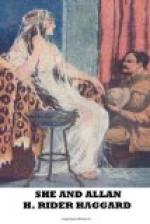I sprang up, snatching at my rifle, for I thought that he meant that we were being attacked again, to see Billali advancing at the head of a train of four litters made of bamboo with grass mats for curtains and coverings, each of which was carried by stalwart Amahagger, as I supposed that they must be. Two of these, the finest, Billali indicated were for Robertson and myself, and the two others for the wounded. Umslopogaas and the remaining Zulus evidently were expected to walk, as was Hans.
“How did you make these so quickly,” I asked, surveying their elegant and indeed artistic workmanship.
“We did not make them, Watcher-by-Night, we brought them with us folded up. She-who-commands looked in her glass and said that four would be needed, besides my own which is yonder, two for white lords and two for wounded black men, which you see is the number required.”
“Yes,” I answered vaguely, marvelling what kind of a glass it was that gave the lady this information.
Before I could inquire upon the point Billali added,
“You will be glad to learn that my men caught some of those rebels who dared to attack you, eight or ten of them who had been hurt by your missiles or axe-cuts, and put them to death in the proper fashion—yes, quite the proper fashion,” and he smiled a little. “The rest had gone too far where it would have been dangerous to follow them among the rocks. Enter now, my lord Watcher-by-Night, for the road is steep and we must travel fast if we would reach the place where She-who-commands is camped in the ancient holy city, before the moon sinks behind the cliffs to-night.”
So having explained matters to Robertson and Umslopogaas, who announced that nothing would induce him to be carried like an old woman, or a corpse upon a shield, and seen that the hurt Zulus were comfortably accommodated, Robertson and I got into our litters, which proved to be delightfully easy and restful.
Then when our gear was collected by the hook-nosed bearers to whom we were obliged to trust, though we kept with us our rifles and a certain amount of ammunition, we started. First went a number of Billali’s spearmen, then came the litters with the wounded alongside of which Umslopogaas and his three uninjured Zulus talked or trotted, then another litter containing Billali, then my own by which ran Hans, and Robertson’s, and lastly the rest of the Amahagger and the relief bearers.
“I see now, Baas,” said Hans, thrusting his head between my curtains, “that yonder Whitebeard cannot be your reverend father, the Predikant, after all.”
“Why not?” I asked, though the fact was fairly obvious.
“Because, Baas, if he were, he would not have left Hans, of whom he always thought so well, to run in the sun like a dog, while he and others travel in carriages like great white ladies.”
“You had better save your breath instead of talking nonsense, Hans,” I said, “since I believe that you have a long way to go.”




